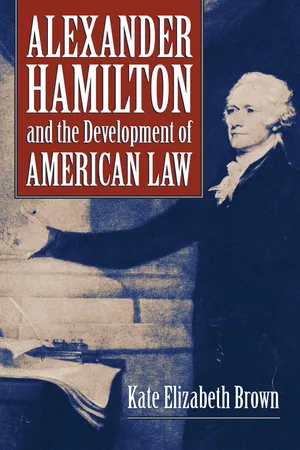
- 328 pages
- English
- ePUB (mobile friendly)
- Available on iOS & Android
Alexander Hamilton and the Development of American Law
About this book
Alexander Hamilton is commonly seen as the standard-bearer of an ideology-turned-political party, the Federalists, engaged in a struggle for the soul of the young United States against the Anti-Federalists, and later, the Jeffersonian Republicans. Alexander Hamilton and the Development of American Law counters such conventional wisdom with a new, more nuanced view of Hamilton as a true federalist, rather than a one-dimensional nationalist, whose most important influence on the American founding is his legal legacy.
In this analytical biography, Kate Elizabeth Brown recasts our understanding of Hamilton’s political career, his policy achievements, and his significant role in the American founding by considering him first and foremost as a preeminent lawyer who applied law and legal arguments to accomplish his statecraft. In particular, Brown shows how Hamilton used inherited English legal principles to accomplish his policy goals, and how state and federal jurists adapted these Hamiltonian principles into a distinct, republican jurisprudence throughout the nineteenth century. When writing his authoritative commentary on the nature of federal constitutional power in The Federalist, Hamilton juxtaposed the British constitution with the new American one he helped to create; when proposing commercial, monetary, banking, administrative, or foreign policy in Washington’s cabinet, he used legal arguments to justify his desired course of action. In short, lawyering, legal innovation, and common law permeated Alexander Hamilton’s professional career.
Re-examining Hamilton’s post-war accomplishments through the lens of law, Brown demonstrates that Hamilton’s much-studied political career, as well as his contributions to republican political science, cannot be fully understood without recognizing and investigating how Hamilton used Anglo-American legal principles to achieve these ends. A critical re-evaluation of Hamilton’s legacy, as well as his place in the founding era, Brown’s work also enhances and refines our understanding of the nature and history of American jurisprudence.
Frequently asked questions
- Essential is ideal for learners and professionals who enjoy exploring a wide range of subjects. Access the Essential Library with 800,000+ trusted titles and best-sellers across business, personal growth, and the humanities. Includes unlimited reading time and Standard Read Aloud voice.
- Complete: Perfect for advanced learners and researchers needing full, unrestricted access. Unlock 1.4M+ books across hundreds of subjects, including academic and specialized titles. The Complete Plan also includes advanced features like Premium Read Aloud and Research Assistant.
Please note we cannot support devices running on iOS 13 and Android 7 or earlier. Learn more about using the app.
Information
Table of contents
- Front Cover
- Half Title
- Title Page
- Copyright Page
- Series Page
- Table of Contents
- Acknowledgments
- Introduction: Alexander Hamilton, Lawyer and Lawmaker
- 1. Creating the Federal Magistracy: Discretionary Power and the Energetic Executive
- 2. Administrative Accommodation in the Federal Magistracy
- 3. Creating the “Commercial Republic”: Neutrality and Law in the American Courts
- 4. Developing the Jurisprudence of Federalism: Hamilton’s Defense of Federal Fiscal Powers
- 5. “A Most Valuable Auxiliary”: Securing Foreign Capital with the Law of the Land
- 6. Litigation, Liberty, and the Law: Hamilton’s Common Law Rights Strategy
- Conclusion: The Federalist
- Notes
- Bibliography
- Index
- Back Cover